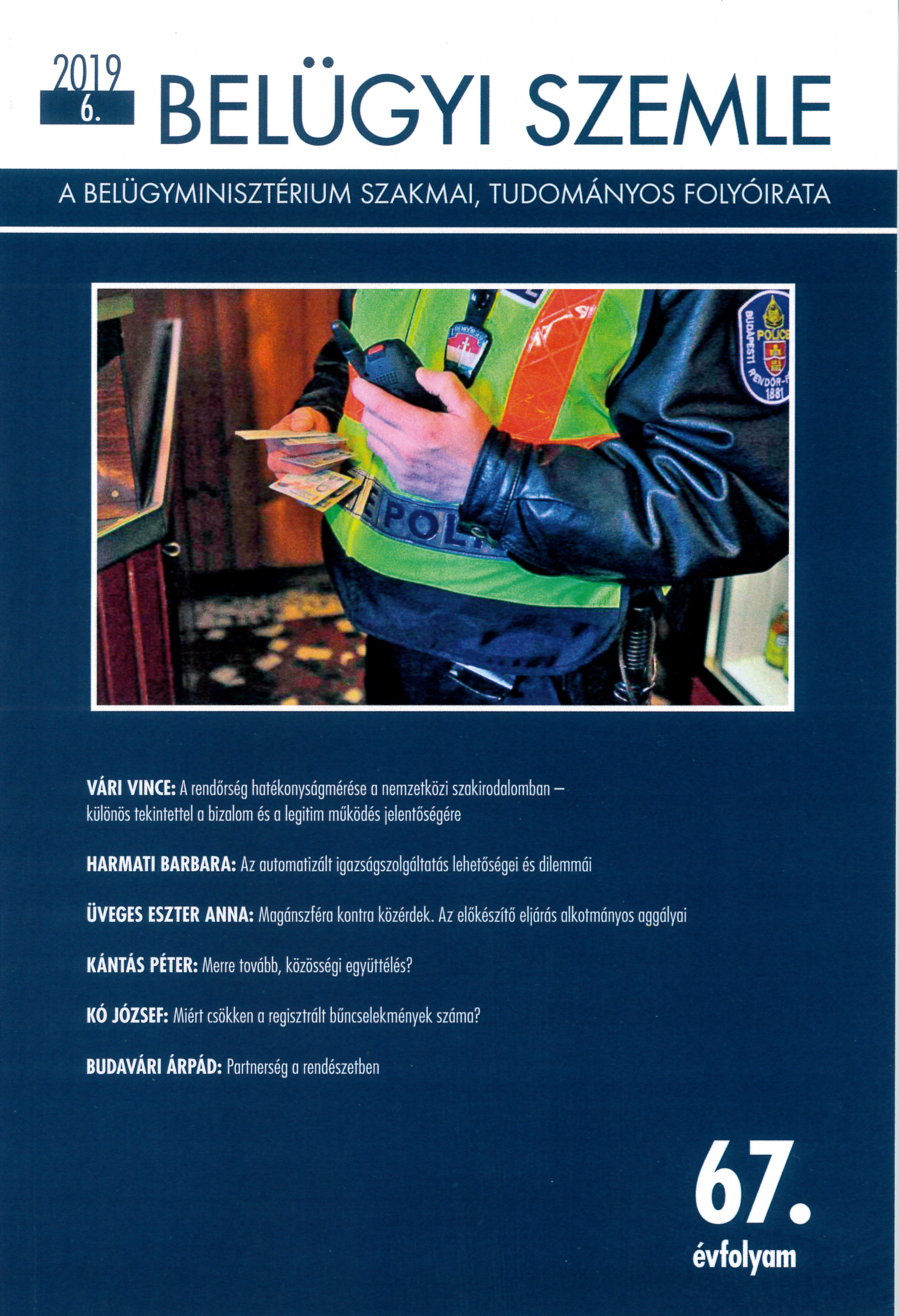Keywords
policing
law enforcement
partnership
law enforcement
partnership
How to Cite
Partnership in law enforcement . (2019). Academic Journal of Internal Affairs, 67(6), 85-99. https://doi.org/10.38146/BSZ.2019.6.6
Abstract
This paper describes the process of pluralisation of Hungarian law enforcement, the relationship between the state and the complementary performers of law enforcement, outlining also desirable directions of further development. The author supports the description by examples gained during his practical work.
Downloads
Download data is not yet available.
Similar Articles
- Géza Finszter, Complementary policing , Academic Journal of Internal Affairs: Vol. 71 No. 1 (2023)
- Zsuzsanna Borbély, Péter Cieleszky, Zoltán Csizner, Gábor Éberhardt, Tünde Pesti, Laura Schmidt, Zita Veprik, Fanni Vizvári, International Law Enforcement Observer I. , Academic Journal of Internal Affairs: Vol. 69 No. 2 (2021)
- Barbara Harmati, Imre Szabó, Predictive policing and automated justice , Academic Journal of Internal Affairs: Vol. 68 No. 5 (2020)
- Judit Borszéki, János Sallai , The beginnings of the history of English and Hungarian policing and criminal justice , Academic Journal of Internal Affairs: Vol. 71 No. 3 (2023)
- Zsolt Lippai, Kund Regényi, Károly Csatári, Tamás Nagy, Examination of the Budapest Party District from the perspective of private and public security , Academic Journal of Internal Affairs: Vol. 71 No. 2.ksz. (2023): Special Issue
- Péter Cieleszky, The Order of Policing , Academic Journal of Internal Affairs: Vol. 71 No. 3 (2023)
- János Sallai, The history of medical or health policing from the antiquity to the end of the 19th century , Academic Journal of Internal Affairs: Vol. 68 No. 5 (2020)
- Szabolcs Mátyás, The History of Law Enforcement in Hungary , Academic Journal of Internal Affairs: Vol. 66 No. 11 (2018)
- József Beke, Péter Cieleszky, Ivett Nagy, Attila Fejes, Éva Rompos, Ádám Kalmár, Ferenc Urbán, Zsolt Lippai, Gergely Péter Pászti, International Law Enforcement Observer II. , Academic Journal of Internal Affairs: Vol. 69 No. 6 (2021)
- Ernő Krauzer, János Sallai, Lajos Szamel, the establisher and messenger of law enforcement science , Academic Journal of Internal Affairs: Vol. 69 No. 9 (2021)
You may also start an advanced similarity search for this article.
Most read articles by the same author(s)
- Árpád Budavári, Tamás Ruff, Perception of safety and cooperativeness among police officers serving in public areas, and identification of public security problems in Fejér County , Academic Journal of Internal Affairs: Vol. 72 No. 4 (2024)
- Árpád Budavári , Zsolt Lippai , Gergely Hlavacska , Ákos Erdélyi, János Tamás Skorka, International Law Enforcement Observer XI. , Academic Journal of Internal Affairs: Vol. 71 No. 9 (2023)
- Árpád Budavári, „To stay human and help” , Academic Journal of Internal Affairs: Vol. 69 No. 6 (2021)
- Árpád Budavári, The change about that even Radio Yerevan could have reported, or the implementation of law enforcement reforms based on the theory of ‘broken windows’ in Kazakhstan and in Ukraine , Academic Journal of Internal Affairs: Vol. 69 No. 7 (2021)
- Árpád Budavári , Tamás Ruff , The police officer’s interpretation of public safety, cooperation skills and the definition of public safety problems in Fejér County based on interviews with police leaders , Academic Journal of Internal Affairs: Vol. 71 No. 8 (2023)
- Árpád Budavári, Fewer wine cellars, more professions Police Cooperation Program between the police forces of Hungary and the Netherlands 1993–1995 , Academic Journal of Internal Affairs: Vol. 71 No. 3 (2023)
- Árpád Budavári, Abstract Police , Academic Journal of Internal Affairs: Vol. 70 No. 5 (2022)
- Árpád Budavári, Reform of the Dutch police , Academic Journal of Internal Affairs: Vol. 70 No. 6 (2022)
- Árpád Budavári, The opportunities of alternative law enforcement in public employment using the example of a Hungarian medium-sized city , Academic Journal of Internal Affairs: Vol. 68 No. 7 (2020)
- Árpád Budavári, On video surveillance – again , Academic Journal of Internal Affairs: Vol. 61 No. 6 (2013)
